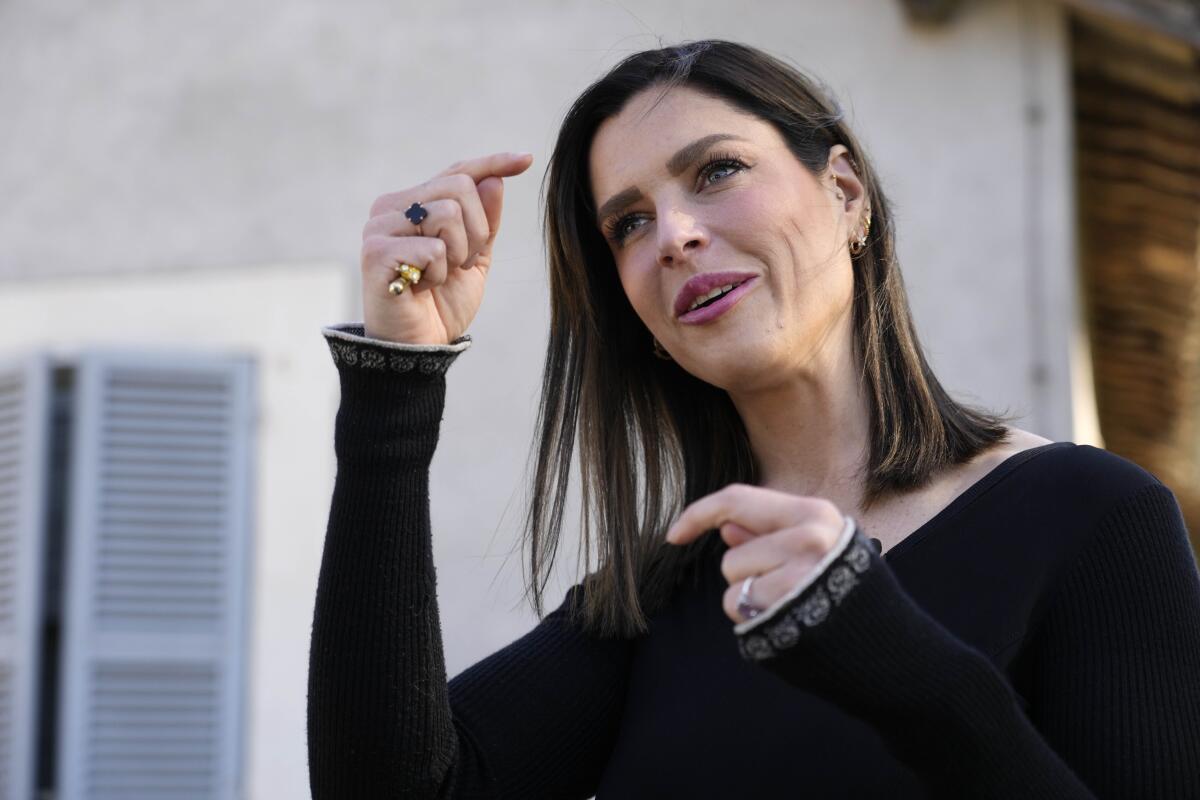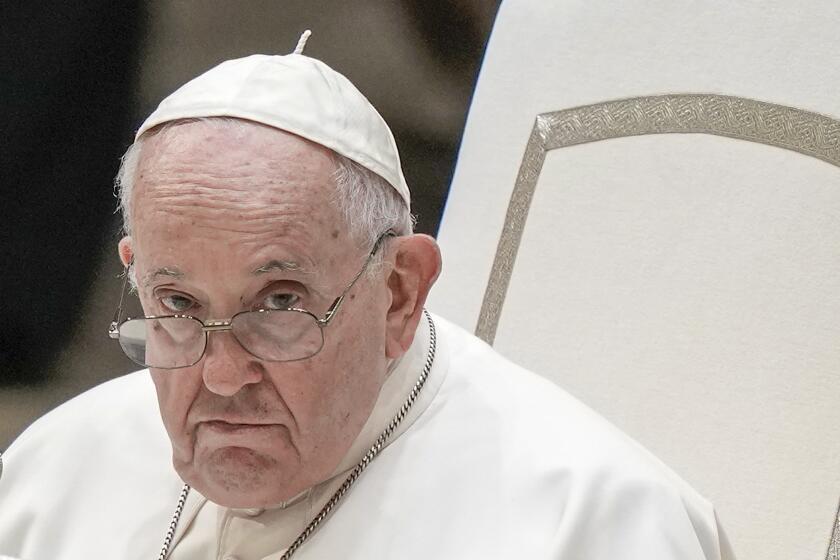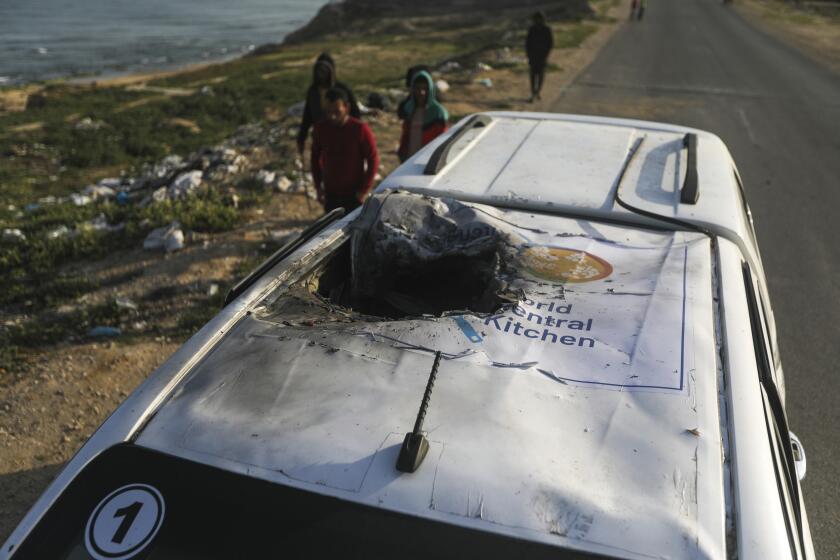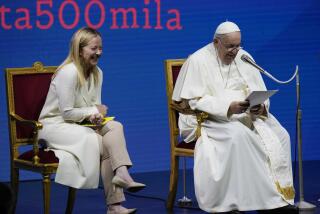An international campaign to ban surrogacy accelerates in Rome

- Share via
ROME — An international campaign to ban surrogacy received a strong endorsement Friday from the Vatican, with a top official calling for a broad-based alliance to stop the “commercialization of life” catering to wealthy would-be parents.
A Vatican-affiliated university hosted a two-day conference promoting an international treaty to outlaw surrogacy, based on the campaigners’ argument that the practice violates U.N. conventions protecting the rights of the child and surrogate mother.
At issue is whether there is a fundamental right to have a child, at any cost, or whether the rights of children trump the desires of potential parents.
The conference, which also drew U.N. human rights representatives and experts, marked an acceleration of a campaign that has found some support in parts of the developing world and western Europe. At the same time, Canada and the United States are known for highly regulated arrangements that draw heterosexual and homosexual couples alike from around the world, while other countries allow surrogacy with fewer rules.
Pope Francis in January called for an outright global ban on the practice, calling it a despicable violation of human dignity that exploits the surrogate mother’s financial need. On Thursday, Francis met privately with one of the proponents calling for a universal ban, Olivia Maurel, a 33-year-old mother of three.
Pope Francis is calling for a universal ban on what he calls the ‘despicable’ practice of surrogate motherhood, saying it commercializes pregnancy.
Maurel was born in the U.S. in 1991 via surrogacy and attributes a lifetime of mental health issues to the “trauma of abandonment” she says she experienced at birth. She says she was separated from her biological mother and given to parents who had contracted with an agency in Kentucky after experiencing infertility problems when they tried to have children in their late 40s.
Maurel says she doesn’t blame her parents and she acknowledges there are “many happy stories” of families who use surrogate mothers. But she says that doesn’t make the practice ethical or right, even with regulations, since she said she was made to sacrifice “for the desire of adults to have a child.”
“There is no right to have a child,” Maurel told the conference at the LUMSA university. “But children do have rights, and we can say surrogacy violates many of these rights.”
She and proponents of a ban argue that surrogacy is fundamentally different from adoption, since it involves creating a child for the specific purpose of separating him or her from the birth mother for others to raise as their own.
Israel’s killing of World Central Kitchen aid workers in Gaza is the latest example of an incident provoking outrage but potentially little deep change.
Monsignor Miloslaw Wachowski, undersecretary for relations with states in the Vatican secretariat of state, concurred, saying the practice reduces human procreation to a concept of “individual will” and desire, where the powerful and wealthy prevail.
“Parents find themselves in the role of being providers of genetic material, while the embryo appears more and more like an object: something to produce — not someone, but something,” he said.
He called for the campaign to ban the practice not to remain in the sphere of the Catholic Church or even faith-based groups, but to transcend traditional ideological and political boundaries.
“We shouldn’t close ourselves among those who think exactly the same way,” he said. “Rather, we should open up to pragmatic alliances to realize a common goal.”
The Vatican’s overall position, which is expected to be crystalized in a position paper Monday on human dignity, stems from its belief that human life begins at conception and must be given the consequent respect and dignity from that moment on. The Vatican also holds that human life should be created through intercourse between husband and wife, not in a petri dish, and that surrogacy takes in vitro fertilization a step further by “commercializing” the resulting embryo.
Islamist militants claimed the concert attack in Russia, but President Vladmir Putin continues to say Ukraine and the West were involved. Why?
As the conference was getting underway, Italy’s main gay family advocacy group, Rainbow Families, sponsored a pro-surrogacy counter-rally to also voice opposition to proposals by Italy’s hard-right-led government to make it a crime for Italians to use surrogates abroad, even in countries where the practice is legal.
“We are families, not crimes,” said banners held by some of the 200 or so participants, many of them gay couples who traveled abroad to have children via surrogate.
A 2004 law already banned surrogacy in Italy. The proposed law would make it illegal in Italy for citizens to engage a surrogate mother in another country, with prison terms of up to three years and fines of up to 1 million euros ($1.15 million) for convictions.
Participants in the rally complained that the law would stigmatize their children and they denied anyone’s rights or dignity was violated in the process, which they noted was legal and regulated.
“All parties involved are consenting, aware,” said Cristiano Giraldi, who with his partner, Giorgio Duca, used a surrogate in the U.S. to have their 10-year-old twins. “We have a stable relationship with our carrier, our children know her. So actually there is no exploitation, there is none of the things that they want the public to believe.”
In the U.S., Resolve: the National Infertility Assn., which advocates for people experiencing infertility problems, has criticized any calls for a universal ban on surrogacy as harmful and hurtful to the many people experiencing the “disease of infertility.”
“Resolve believes that everyone deserves the right to build a family and should have access to all family building options,” Betsy Campbell, Resolve’s chief engagement officer, said in a telephone interview. “Surrogacy, and specifically gestational carrier surrogacy, is an option.”
She said the U.S. regulations, which include separate legal representation for surrogate and the intended parents, and mental health and other evaluations, safeguard all parties in the process.
“Most people do not expect to have infertility or to need medical assistance to build their families,” she said. “So when nonmedical people speak about IVF and surrogacy in a negative way, it can be very discouraging and make an already challenging journey all the more challenging.”
Velina Todorova, a Bulgarian member of the U.N. Committee on the Rights of the Child, told the Rome conference that the U.N. committee hasn’t taken a definitive position on surrogacy, but that its concern was the rights of children born via surrogacy.
It was a reference to legislation to prevent parents from being able to register the births of children born through surrogacy in their home countries.
“We do want states to allow children who have been born as a result of surrogacy to be able to regularize their status in one way or another based on a determination of their best interest, regardless of whether the surrogacy was legal or not, or where it was carried out domestically or abroad,” she said.
Winfield writes for the Associated Press. AP journalist Paolo Santalucia contributed.
More to Read
Sign up for Essential California
The most important California stories and recommendations in your inbox every morning.
You may occasionally receive promotional content from the Los Angeles Times.













